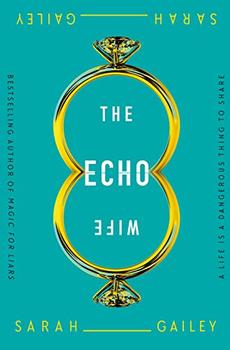Summary | Excerpt | Reviews | Beyond the Book | Readalikes | Genres & Themes | Author Bio

Six people repeated my name, and they touched their glasses together, and the heavy air rang crystalline. The woman across from me exhaled as she drank, the glass near her nostrils fogging. She caught my eye and smiled, and I looked away before I could even try to make myself smile back.
The lights in the room began to dim. A spotlight illuminated the podium at the front of the room.
The air was so heavy.
I held my breath for a few seconds before swallowing my mouthful of wine, willed my heartbeat to slow down. There was no reason to be nervous. There were no surprises coming to get me. That silver helix up on the podium had my name engraved on it. The speeches that would take up the next hour were already written, were about me and my work. My face was the one on the posters lining the banquet hall. An evening to honor and celebrate Dr. Evelyn Caldwell, that's what had been on the engraved invitations.
Everything was good. Everything was already decided. Everything was for me.
Nothing would go wrong.
Your legacy, Federlauer had said. This, tonight, this would be what I was remembered for. This would be the focus of my eulogy. Not the other thing, not the shameful disaster that my life had briefly become thanks to Nathan. No one would be talking about that—about Nathan and his weakness. It would be this, just this, my work and my research and my success.
I lifted a hand to tuck a strand of hair behind my ear, then arrested my arm in the middle of the movement, Nathan's voice ringing through my memory. Don't fidget. You look exactly like your mother when you fidget.
He'd been right. He'd been cruel about it, cruel on purpose, but he'd been right to remind me. I already looked so much like my mother that, in my graduate program, the jokes wrote themselves. Wow, it looks like the cloning research is going well! It was bad enough to have the same colorless hair, the same dishwater-gray eyes, the same thin mouth as that woman. I wouldn't act like her too.
I'd left that behind long ago—being anything like her, doing the things she did to get to the end of each day intact. I'd left that behind and I'd never looked back.
Poise, that was the way. No twitching. No fidgeting. Poise.
I lowered my hand to my lap, curled it into a fist and nested it inside my other palm. No one would be able to see me clenching that fist, digging my nails into the soft valleys of flesh between the tendons of my hand. Even to the forgettable Federlauer, I would seem composed.
The room was full of eyes, and I reminded myself that I could hide from every single one of them. I knew how to walk quietly. I knew how to slip by unnoticed. I knew how to be the thing they wanted to see, the thing they wanted me to be.
I knew how to hide when I needed to.
I had gotten through the previous year of impossibly hellish obstacles. I had survived the discovery and the betrayal and the fallout. I could handle this banquet.
On stage, a woman I'd never met was talking about my early research. She clutched the microphone in a white-knuckled stage-fright grip, and described the initial stages of my work in glowing terms. It was, quite frankly, mortifying. Neuropsychology, neurobiology, hormonal conditioning—it seemed so entry-level now, so sophomoric. At the time, it had seemed like the biggest thing in the world. It had seemed worth every late night in the lab, eating takeout with Nathan while samples spun in the gravity centrifuge.
The woman onstage called that work brilliant, and I choked back a startled laugh. We were so young then, balancing notebooks full of handwritten lab notes on our knees, trying not to spill noodles on the pages. Falling in love. We had dreamed of a night like this: me in a ball gown, him in a tuxedo. Two names engraved on a silver double helix.
A legacy.
I caught myself balling up my napkin in my fist, reflexively clutching at the fabric. I smoothed it out, creased it carefully, and set it next to my plate. I folded my hands. Poise, Evelyn, I repeated to myself. Poise.
Excerpted from The Echo Wife by Sarah Gailey. Copyright © 2021 by Sarah Gailey. Excerpted by permission of Tor Books. All rights reserved. No part of this excerpt may be reproduced or reprinted without permission in writing from the publisher.




Poetry is like fish: if it's fresh, it's good; if it's stale, it's bad; and if you're not certain, try it on the ...
Click Here to find out who said this, as well as discovering other famous literary quotes!
Your guide toexceptional books
BookBrowse seeks out and recommends the best in contemporary fiction and nonfiction—books that not only engage and entertain but also deepen our understanding of ourselves and the world around us.